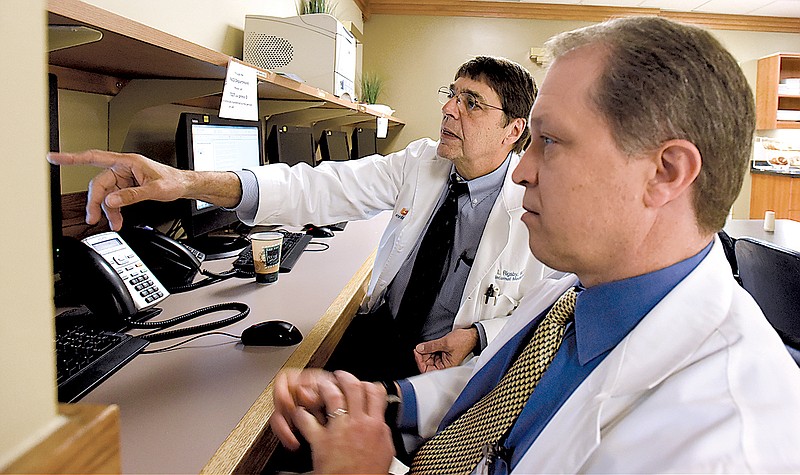The switch from paper to medical electronic records was supposed to make life easier for doctors. Medicine was going to become more streamlined. Doctors could see more patients and could collaborate more on their care.
But so far, many physicians say the shift has only made doctoring more complicated. They spend more time clicking boxes on computer screens and less time face-to-face with patients. There's more busywork, they say.
Dr. Joseph Huffstutter, a rheumatologist with Arthritis Associates in Hixson, says he doesn't feel comfortable bringing a computer into the patient room.
"So many things in medicine deal with nonverbal cues and facial expressions that I'm afraid I'll miss if I'm looking at a computer," he said.
But the most frustrating component of electronic systems, doctors and health industry experts say, is that often one doctor's software isn't able to communicate with another doctors' software -- defeating the point of collaborative care.
"In Chattanooga, each hospital has its own electronic system, with its own nuances," said Lela McFerrin, president of the Tennessee Health Information Management Association and director of health information management for Parkridge Health System.
"That can be especially frustrating for doctors moving from hospital to hospital."
Even within one hospital, different departments use different systems. That means patient data has to be entered multiple times, or faxed between offices.
"Problems with health IT has been the number one frustration I've heard from our physicians," said Erlanger Health System CEO Kevin Spiegel.
But federal requirements mean electronic records are here to stay. So providers are trying to find the best ways to adapt as the technology evolves.
For Erlanger, that looks like a nearly $100 million investment over the next decade for a state-of-the-art system that will bring electronic records "up to par with Gig City," Spiegel said.
The "integrated" platform from Epic Systems should allow information to flow seamlessly between departments and physician practices.
"It will help us know what is happening every minute, from when they come into our doors to the time they leave," said Tish Ingalls, Erlanger's chief technology officer.
Spiegel said if the board approves, the system will be "one of the most important things we will have the opportunity to make a decision on in the near future." Installing the complex platform could bring roughly 200 jobs to the health system.
CHI Memorial Health Care System is also shifting to electronic record-keeping. Starting last month, 27 of the hospital's physician practices began the move to a system called Allscripts TouchWorks.
The program will go live in September, said Paul Marsh, head of information technology for Mountain Management Services, Memorial's arm for physician services.
Those doctors now rely mostly on paper records, faxing them between offices as needed. Some doctors are apprehensive about the switch to digital, Marsh said. But many are excited.
"This will bring everyone on the same platform, which will really allow us to improve the continuity of care for our patients," he said.
McFerrin said Parkridge has multiple record-keeping systems across departments, but they all feed into a single MEDITECH information system.
The switch to electronic records has caused growing pains, but McFerrin said the potential benefits are enormous, from preventing duplication of treatments, to flagging dangerous drug interactions, to giving patients better information on the care they receive.
"It's exciting because patients are logging into their electronic portals and looking at their information," she said. "They can track their blood pressure or labs, and dispute anything that looks wrong. I do think that once these are up and running, quality will improve."
FEDERAL SCRUTINY
Medicine has long lagged behind the larger societal move into the digital age.
That's because patient health data is hyper-individual, highly complex and very private, McFerrin said.
But doctors now have little choice under a federal program established under the 2009 economic stimulus package.
For the last several years, providers have gotten a carrot: Billions in incentives to help them buy the programs. This year, the stick kicks in: Medicare will dock reimbursements for doctors who fail to meet criteria.
But doctors say the process didn't work like it should have.
"So much money has been spent, but really, the way the systems were set up, they're no better than a paper chart," said Huffstutter. "You can't share anything."
Earlier this month, Senate health committee Chairman Lamar Alexander, R-Tenn., called the taxpayer-subsidized program a "failed promise." He joined with the committee's ranking Democrat, Sen. Patty Murray of Washington, to create a bipartisan working group to find ways to improve the transition.
"The federal government has spent $28 billion to drive the adoption of these records systems, and the result is that doctors don't like the systems," Alexander said in opening remarks at a May 5 hearing. "They say they disrupt work flow, interrupt the doctor-patient relationship, and haven't been worth the effort."
The group plans ask health industry and IT leaders whether the program can be improved through administrative fixes or if Congress needs to take action.
Chattanooga-Hamilton County Medical Society Director Rae Bond said many physicians who invested early in systems have had to go back to the drawing board. Others have waited to see how the technology develops and which systems work best.
"Establishing some common standards for interoperability of these system on the front end would have saved everyone some time and money," she said. "We still have a ways to go before they fulfill the promise that they were intended for."
Contact staff writer Kate Belz at kbelz@timesfreepress.com or at 423-757-6673.
